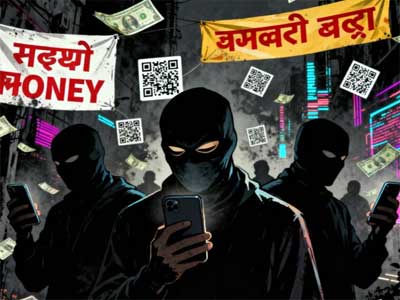India stands at a dangerous crossroads where digital progress collides with a burgeoning fraud industry. From fake diabetes cures to political bribery, honey traps to sophisticated crypto scams, the country's integrity is under assault in a sprawling carnival of deceit. Trust is eroding as every click risks a trap, and every promise masks a con.
Home-makers fall prey to ‘online job’ scams, businessmen lose fortunes to cyber mafias, and young lovers are ensnared by digital blackmail. The rot extends from the halls of Parliament to private clinics once revered for spirituality, driving India towards becoming the ‘Scam Factory of the World’.
Read in Hindi: ठगी की अर्थव्यवस्था का स्याह काला चेहरा
The scale is staggering. According to government and cybersecurity reports, online fraud losses in India are projected to exceed ₹20,000 crore by year-end—a 200 per cent spike from 2024. The digital tools that ushered in India’s tech revolution, UPI, social media, instant payments, and smartphones, have also become the weapons of choice for modern con artists.
Simple texts, like ‘Your KYC is expiring’, or enchanting job offers are often the opening gambit. Housewives chase fake ‘online tasks’, students pay ‘processing fees’ for illusory employment, and even bankers and engineers fall victim to AI-crafted scams, explains IT expert Vikas.
Millions of UPI users find themselves trapped in a sinister game where scanning a QR code or clicking a forged link can drain accounts instantly. This year alone, over one lakh UPI scam cases are expected, causing losses north of ₹3,000 crore. Although individual losses average between ₹1,000 and ₹5,000, the cumulative effect is devastating. Law enforcement recovers only 20 per cent of stolen funds, with the remaining money vanishing through mule accounts routed abroad.
Old Ponzi schemes re-emerge in digital guise, fake trading apps, crypto tokens, and AI bots promising ‘double income’ empty pockets with alarming speed. Over 30,000 investment scams detected in 2025 wiped out ₹1,500 crore.
Connections run deep, extending to Southeast Asia’s fraudulent call centres in Myanmar and Cambodia, manned by Hindi-speaking gangs operating round the clock. Deepfake CEOs, ‘verified’ websites, and fake influencers lure victims until servers shut down and money disappears.
In cities like Delhi alone, ₹300–400 crore has vanished to digital investment scams, with recovery rates less than 20 per cent. Shame and lack of resources keep most victims silent, burying cases unheard.
The ‘digital arrest scam’ tops the terror list, according to computer expert Chaturbhuj Tiwari. Scammers impersonate police officers in video calls so realistic they could fool anyone, with badges, files, and official language, extorting lakhs in ‘bail’ money. Over 80,000 fell victim last year, losing ₹6,000 crore.
With unemployment soaring, job scams have morphed into an epidemic. Thousands have lost money through fake offers on WhatsApp and LinkedIn, with fraudsters cloning company logos and HR profiles, demanding ‘verification’ and ‘training’ fees.
Even education is targeted. Cyber fraudsters duped students and parents of ₹800 crore, invoking the names of reputed coaching institutes. New scams emerge even as arrests are made, with AI chatbots conducting bogus interviews to maintain the illusion of legitimacy.
Trust-based scams cause the deepest wounds. Thousands of women on matrimonial platforms are duped by fake NRI, doctor, or CEO grooms, who extract huge sums with AI-edited photos and fabricated conversations.
Requests for ‘visa’, ‘customs’, or ‘medical’ payments complete the deception. In 2025 alone, losses in such cases topped ₹1,000 crore, many hidden by victims’ shame or fear.
AI is now the scammers’ greatest weapon. Imagine calls mimicking a daughter’s voice pleading for urgent help, fake voices, real fear.
Deepfakes erase the line between truth and fiction. Scammers mimic CEOs, officials, and celebrities, extracting crores. One case involved millions lost to a cloned telecom tycoon’s voice. Total losses from such scams exceed ₹1,000 crore this year.
The damage extends beyond wallets to mental health. Victims report depression, paranoia, and social withdrawal. As one said, “They didn’t just steal my money; they killed my trust.”
Technology promised empowerment, but without awareness, it now embodies helplessness. Behind the shining screen of ‘Digital India’ lurks the darker underworld of ‘Scamistan’, spreading its shadow ever wider.
















Related Items
India’s ‘Unique’ Journey as a Republic…
India rises as a ‘Global Medical Travel Destination’
A social revolution India has been waiting for…